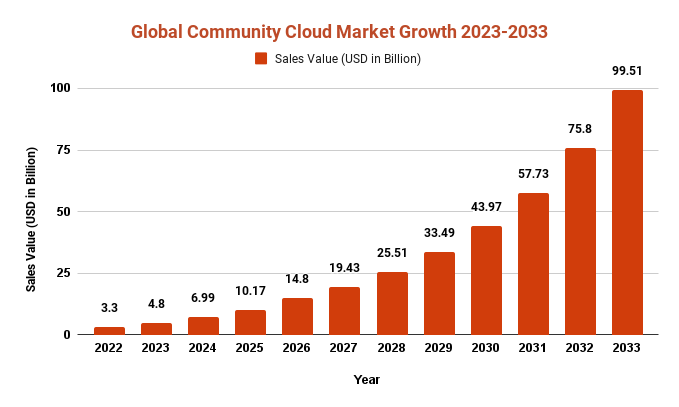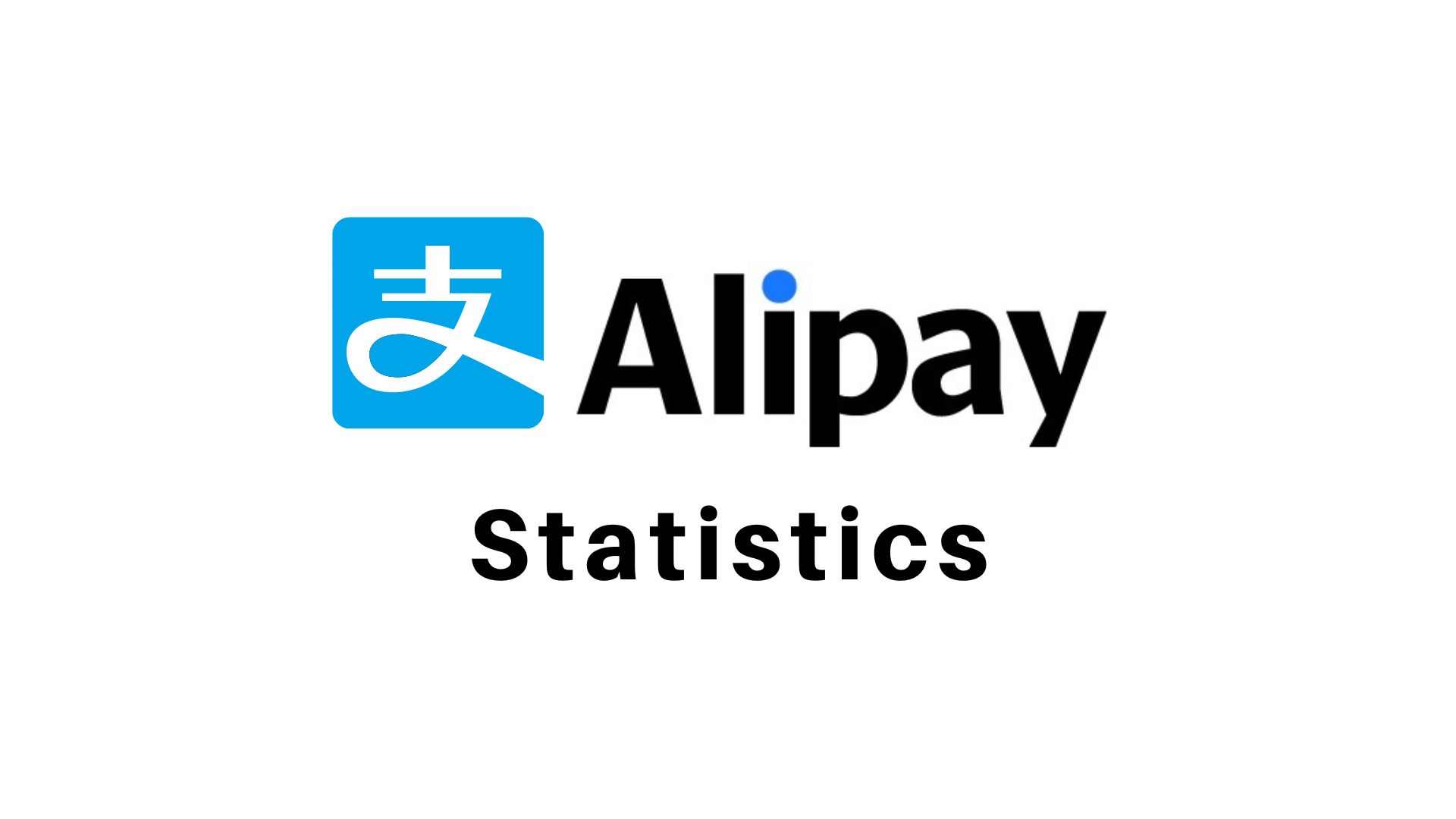Community Cloud Market size is expected to reach USD 99.51 Bn by 2033

Page Contents
Market Overview
Published Via 11Press: Community Cloud Market refers to a form of cloud computing deployment where multiple organizations with similar business goals or objectives share an infrastructure owned and managed by either themselves or an independent service provider. Community clouds aim to provide organizations with similar needs a collaborative environment for meeting compliance, security and data privacy regulations. By pooling their resources they can achieve economies of scale while simultaneously lowering costs.
The Community Cloud Market size is expected to reach USD 99.51 Bn by 2033, up from its current value of USD 3.3 Bn in 2022, growing at an annual compound growth rate (CAGR) of 31.29% from 2023-2033.
Community clouds can either be public or private depending on the level of access and control granted to participating organizations. A public community cloud typically utilizes third-party providers while private community clouds utilize one of their participating organizations as infrastructure providers. Community cloud models offer many advantages, including increased efficiency, lower costs, enhanced security and compliance measures, and better collaboration. But they may present certain challenges, including needing strong governance mechanisms, effective communication channels, and aligned goals among participating organizations.
Key Takeaways
- Community cloud is a form of cloud computing deployment model in which multiple organizations with similar business goals or interests share an infrastructure cloud system.
- The community cloud model enables organizations to pool their resources to achieve economies of scale and reduce costs.
- Community clouds can either be public or private depending on the level of access and control granted to participating organizations.
- Community cloud models provide numerous advantages, including increased efficiency, reduced costs, enhanced security and compliance measures, as well as greater collaboration.
- Challenges presented by community cloud models include creating an effective governance structure, effective communication channels, and aligning goals across participating organizations.
- Community cloud models offer organizations an attractive solution for using cloud computing while meeting specific business requirements and concerns.

Request Sample Copy of Community Cloud Market Report at: https://marketresearch.biz/report/community-cloud-market/request-sample/
Regional Snapshot
- North America: Community cloud adoption in North America has reached maturity, with numerous organizations taking advantage of this model in healthcare and government organizations in this region. Healthcare and government entities being particularly avid supporters.
- Europe: Europe is another mature market for community cloud, with numerous organizations taking advantage of it to meet data privacy and compliance regulations. Financial services firms and healthcare practitioners in particular are among the primary adopters.
- Asia-Pacific: Community cloud has seen tremendous success across Asia-Pacific region. Many organizations from China, Japan and India are adopting this model of service delivery; manufacturing, retail and healthcare sectors being among its primary users in this region.
- Middle East and Africa: The Middle East and Africa is an emerging market for community cloud, with various organizations exploring this model as a solution to security and compliance challenges. Key adopters include government entities, healthcare facilities, energy suppliers, and energy consumers in this region.
- Latin America: Latin America's community cloud market is still relatively new, with only a handful of organizations adopting this model so far. But this market shows great promise for growth–particularly within sectors like healthcare and financial services.
Drivers
- Cost Savings: One of the primary motivations behind community cloud adoption is cost savings. By pooling resources, organizations can achieve economies of scale that result in lower infrastructure, maintenance, and management expenses.
- Compliance Requirements: Many industries require them, like HIPAA for healthcare or PCI DSS for financial services. Community cloud allows organizations in these industries to share a common infrastructure that satisfies these compliance needs.
- Security: Cloud computing security can be a concern for organizations. By sharing a community cloud infrastructure equipped with advanced security features, organizations can share a reduced risk of data breaches or cyber attacks.
- Collaboration: Community cloud can facilitate collaboration among organizations by allowing them to share data and collaborate on shared projects – leading to increased productivity, improved innovation, and superior outcomes.
- Resource Optimization: Community clouds offer organizations an effective solution to optimize their resources by sharing infrastructure and applications across them, leading to greater resource utilisation, reduced downtime, and an overall improvement in efficiency.
- Scalability: Community cloud can enable organizations to expand their infrastructure quickly and effortlessly without incurring additional hardware or software expenses.
Restraints
- Governance: For community cloud to work successfully, effective governance must ensure all organizations involved are aligned and working towards common goals. Without appropriate oversight, conflicts and other issues could impede adoption and have serious repercussions for adoption efforts.
- Trust: Trust is central to community cloud initiatives' success, as participating organizations rely on each other for sharing infrastructure and applications while respecting data privacy and security. Absence of this trust could discourage participation.
- Integration: Integrating existing systems and applications can be a significant barrier to community cloud adoption, necessitating participating organizations to invest time and resources in making sure their existing applications can integrate with the community cloud infrastructure.
- Data Sovereignty: Organizations operating in regulated industries face increasing data sovereignty concerns, especially as more organizations rely on community cloud. Sharing infrastructure between organizations raises questions of data sovereignty and ownership that should be carefully managed by each participant in such environments.
- Vendor Lock-in: Organizations who utilize community cloud services from third-party providers must ensure they can move their applications and data to other providers or even back onto their own infrastructure if needed, to avoid vendor lock-in.
- Customization: Community cloud environments present unique customization challenges due to sharing infrastructure and applications between participating organizations. Each organization must ensure their specific customization requirements can be fulfilled within this shared cloud environment.
Opportunities
- Industry-Specific Solutions: Community Cloud can offer industry-specific solutions that address the unique needs and challenges faced by organizations within a certain industry, leading to improved efficiency, cost savings and superior outcomes.
- Innovation: Community cloud environments enable organizations to share ideas, knowledge, and resources, enabling new products, services, business models that drive growth while giving organizations competitive advantages.
- Agility: Community cloud solutions enable organizations to quickly adapt to ever-evolving business requirements and market conditions, leading to quicker time-to-market, improved customer satisfaction ratings and overall improved performance.
- Ecosystems: Community cloud can facilitate the formation of ecosystems spanning multiple organizations, vendors and service providers – creating new opportunities for collaboration, innovation and revenue generation.
- Scalability: Community cloud can offer organizations the ability to scale up quickly and effortlessly, without needing to invest in additional hardware or software. This enables businesses to take advantage of new business opportunities quickly while expanding operations.
- Lower Entry Barrier: Community clouds offer small and midsized organizations access to advanced infrastructure which would otherwise be prohibitively expensive, leveling the playing field between smaller businesses and their larger counterparts and giving smaller organizations an equal chance at competing successfully in business.
Challenges
- Governance: Effective governance is essential to the success of community clouds. Participating organizations must establish governance structures, policies, and procedures that ensure alignment and cooperation between participants. A lack of effective governance could lead to conflicts or other issues which would impede adoption.
- Trust: Trust is central to community cloud success. Participating organizations must trust one another enough to share infrastructure and applications while protecting data privacy and security; otherwise they may decline participation in community cloud initiatives.
- Integration: Integrating existing systems and applications can be a major hurdle when adopting community clouds. Participating organizations must ensure their existing applications can seamlessly work within the community cloud infrastructure, which may require significant time and resource investments from them.
- Data Sovereignty: Data sovereignty is an ongoing challenge for organizations operating in regulated industries, while community clouds require them to share infrastructure which raises questions regarding data sovereignty and ownership.
- Security: Organizations' top concern when it comes to cloud computing is security. Community clouds offer organizations the ability to share a secure infrastructure, reducing risks related to data breaches and cyber attacks while simultaneously safeguarding against data breaches and attacks. But companies must ensure that the measures put in place are sufficient in protecting their data.
- Vendor Lock-in: Vendor lock-in can be an issue when organizations use community cloud services from third-party providers. They should ensure they can migrate applications and data between providers if necessary or back onto their own infrastructure if necessary.
Market Segmentation
Application
- Cloud-Based Storage
- Cloud Backup And Recovery
- Cloud Security And Data Privacy
- Web-Based Applications
- High-Performance Computation (HPC) And Analytics
vertical
- BFSI
- Gaming
- Government
- Healthcare
- Academia and Education
- Others
service
- Professional Services
- Consulting Support Services
- Training Support Services
- Maintenance Support Services
- Customer/Public Portal Services
- Regulation and Compliance Services
- Other Services
components
- Hardware
- Server
- Storage components
- Networking Peripherals
- Software
- Enterprise Applications
- Collaboration Tools
- Dashboards
- Business Intelligence
Key Players
- Amazon Web Services LLC
- Cisco Systems
- Atos SE
- Akamai Technologies Inc.
- VMware Computer Sciences Corporation
- Google Inc.
- Amadeus IT Group SA
- Microsoft Corp.
- IBM Corporation
Report Scope
| Report Attribute | Details |
| Market size value in 2022 | USD 3.3 Bn |
| Revenue forecast by 2033 | USD 99.51 Bn |
| Growth Rate | CAGR Of 31.29% |
| Regions Covered | North America, Europe, Asia Pacific, Latin America, and Middle East & Africa, and Rest of the World |
| Historical Years | 2017-2022 |
| Base Year | 2022 |
| Estimated Year | 2023 |
| Short-Term Projection Year | 2028 |
| Long-Term Projected Year | 2033 |
Request Customization Of The Report: https://marketresearch.biz/report/community-cloud-market/#request-for-customization
Recent Developments
Community cloud is an ever-evolving field, and several recent advancements deserve special recognition. Here are a few noteworthy updates in community cloud:
- Hybrid Community Cloud: A hybrid community cloud combines public and private cloud infrastructures for organizations to provide a flexible, scalable solution. This model allows organizations to use public clouds for non-sensitive applications while keeping sensitive applications and data secured on private cloud infrastructures.
- Multi-Cloud Community Cloud: Organizations using multi-cloud community clouds can leverage multiple cloud providers to form one large community cloud environment, providing greater flexibility, redundancy and reduced vendor lock-in risks.
- Edge Computing in Community Cloud: Edge computing has quickly become one of the key tenets of community cloud, as it enables organizations to process data closer to its source, thus reducing latency and increasing performance. This feature is particularly advantageous when processing real-time IoT applications or other real-time applications require real-time processing capabilities.
- Industry-Specific Community Clouds: Industry-specific community clouds have quickly emerged as an effective way of providing tailored solutions to organizations within a particular field or industry, such as healthcare. A healthcare-specific community cloud allows healthcare organizations to easily share patient data while also working together on research.
- Blockchain in Community Cloud Solutions: Blockchain technology is being integrated into community cloud solutions to increase security and privacy, creating a distributed ledger which tracks transactions while guaranteeing data integrity.
Key Questions
Q: What is community cloud?
A: Community cloud is a type of cloud computing model which enables multiple organizations with similar needs to share a single cloud infrastructure.
Q: What are the advantages of community cloud?
A: Community clouds offer multiple advantages for business, including cost reductions, increased efficiency, better collaboration between employees, increased security and custom solutions designed to fit specific industries.
Q: What are the challenges associated with community cloud?
A: Challenges associated with community cloud may include effective governance, trustworthiness, integration with existing systems, data sovereignty protection and security and avoiding vendor lock-in.
Q: How is Community Cloud Evolveing?
A: Community clouds have evolved significantly over time, including hybrid and multi-cloud models emerging, integration of edge computing and blockchain technology, as well as development of industry-specific community clouds.
Q: How can organizations determine whether community cloud is appropriate for them?
A: Organizations can determine whether community cloud is suitable for them by carefully considering their individual needs and objectives, considering its potential benefits and challenges, and selecting providers with whom they work on partnership agreements.
Contact us
Contact Person: Mr. Lawrence John
Marketresearch.Biz (Powered By Prudour Pvt. Ltd.)
Tel: +1 (347) 796-4335
Send Email: [email protected]
The team behind market.us, marketresearch.biz, market.biz and more. Our purpose is to keep our customers ahead of the game with regard to the markets. They may fluctuate up or down, but we will help you to stay ahead of the curve in these market fluctuations. Our consistent growth and ability to deliver in-depth analyses and market insight has engaged genuine market players. They have faith in us to offer the data and information they require to make balanced and decisive marketing decisions.



